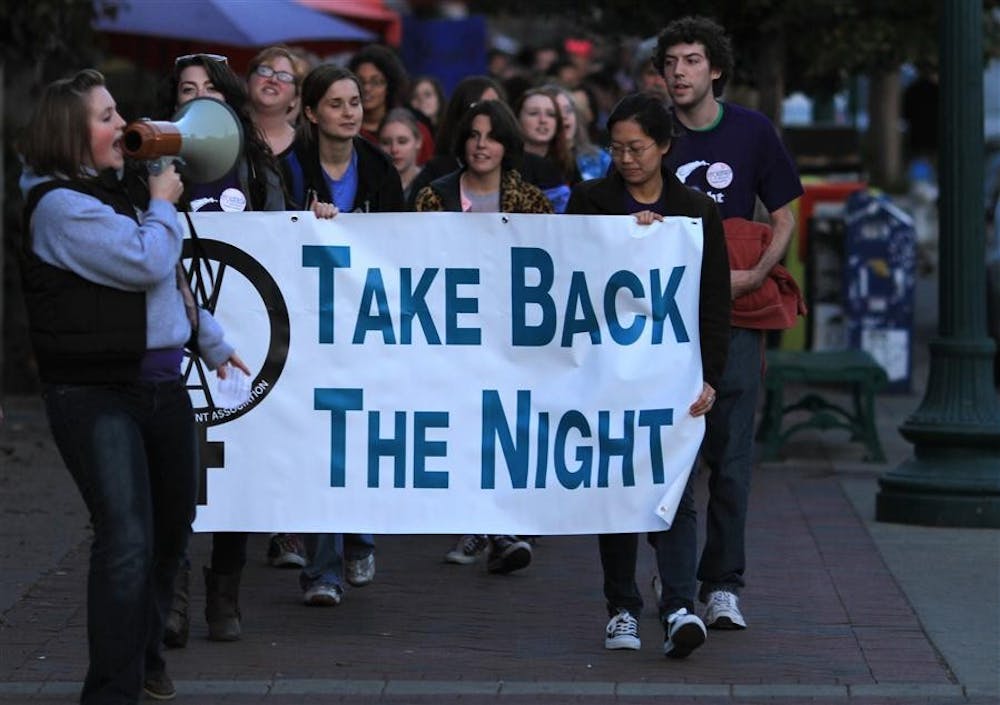"There were pictures.” “He was my stepfather.” “I don’t want to make this a big deal.” One by one, on the steps of the Monroe County Courthouse, they told their stories.
The first Take Back the Night was a response. In 1975, microbiologist Susan Alexander Speeth was stabbed by a stranger late one night on the way to her Philadelphia home.
The event was organized in her honor, and for the past 34 years, men and women have gathered together at marches, rallies and walks, sometimes through hostile territory, drawing attention to the survivors and the victims.
For more than 10 years, the IU community has participated in Take Back the Night. Some years there are more people there than others, but every year there are stories.
This year’s Take Back the Night was organized by the Women’s Student Association and sponsored by the IU Student Association.
(Video of this year's Take Back the Night)
In the wake of two sexual assaults following the IU-Michigan football game and several high profile incidents on campus throughout the past year, the campus conversation has had to change, said senior and IUSA Women’s Affairs Director Sarah Robinson.
“I think it’s getting better,” Robinson said. “There hadn’t been enough conversation about it, especially not in proportion to how frequently it happens.”
Robinson, who also works at the Middle Way House, an organization involved with Take Back the Night, said that the event shows campus-wide solidarity against sexual assault — an important part of preventing sexual assaults that frequently do not involve a stranger attacking a victim.
Before marching to the courthouse, supporters gathered in Dunn Meadow. They mingled while singer-songwriter Tessa Wilhelm and acoustic duo Intentions to Break performed.
When the music stopped, members of the Women’s Student Association introduced a series of speakers, ranging from President of Kappa Delta Laurence Cormier, assistant women’s basketball coach Amaka Agugua and Mimi.
Mimi was a freshman at Butler University 30 years ago. She had rushed a sorority, and in between feeling anxious and excited about it, she had mustered the courage to ask an upperclassman to the fall hayride social.
In their date before the party, he had made sexual advances toward her, and at every instance, Mimi said no.
She wanted to party, she wanted to have fun, she did not want to have sex with him, she said.
That date ended, and when it came time to go to the social, Mimi went with him. The party was fun. She drank, she enjoyed her friends ,and at the end of the night she went back to his dorm.
There was someone else in the dorm, but it made no difference. Mimi remembered kissing him and then blacking out. When she woke up, he was on top of her, she was naked from the waste down and his friend was still in the room. Mimi fled back to her sorority.
Unable to remember the combination lock, she slept outside curled in the fetal position.
Before she left the stage, she told the audience that she started having conversations with her son that no always means no.
A few hours and half a mile march later, a gaggle of 20-somethings told their own stories.
Some were like Mimi, out partying with their friends only to wake up to something they imagined only happened to other people. Others were victimized by grandparents or cousins or doctors.
All of them carried the experience with them.
When the march ended at the courthouse steps, Middle Way House Crisis Intervention Coordinator Tina Cornetta spoke about the pervasiveness of domestic and sexual abuse and the things we can do to stop it.
She sat down, and then there was silence. For a while, cars passed and candles lit, and there was still silence.
Sam spoke first. He was a female to male transgender, and he’d been abused by his doctor. About 18 years later, he found out that his sister had experienced the same thing.
Then another man stood up, and without telling the audience who he was, he talked about something he had only spoken to a few people about.
He told them that no always means no, but sometimes no means not saying yes.
Jessi wasn’t a victim herself. Her older sister had been assaulted in the seventh grade, and when her sister told Jessi how painful the experience had been, Jessi didn’t say anything. Jessi didn’t understand.
Pushing through the tears and clearing her throat, Jessi told an audience of strangers that when someone you love comes to you like her sister had, you listen to them, you do what you can to not shut down.
For about an hour, people like Sam, Jessi and Mimi told their stories. With monosyllabic names, or sometimes no name, they marched to the courthouse to talk to strangers about their experiences.
On Indiana Avenue there were signs that read “Take Back the Night,” “No More Violence” and “Women Unite.” The speeches, the signs, the candle light vigil — it was all an effort to show support, to show solidarity.
Sexual assault is an area plagued by under reporting and it’s something the organizations behind this year’s Take Back the Night deal with on a regular
basis. In the end, the issue of sexual assault comes down to how each victim feels.
“You can’t blame the victim for not reporting,” Jenna Graham, Women’s Student Association president, said a couple of days before the march.
“One of the things that hinders a lot of people from reporting is that they know the person that attacked them.”
Graham said that sexual assault isn’t something that can be stopped by blue lights, it is something that the community has to do. Bystanders have to step in, she said. As a campus, as a community, people have to stop it when they see it.
Students, survivors gather to honor victims at Take Back the Night

Get stories like this in your inbox
Subscribe





